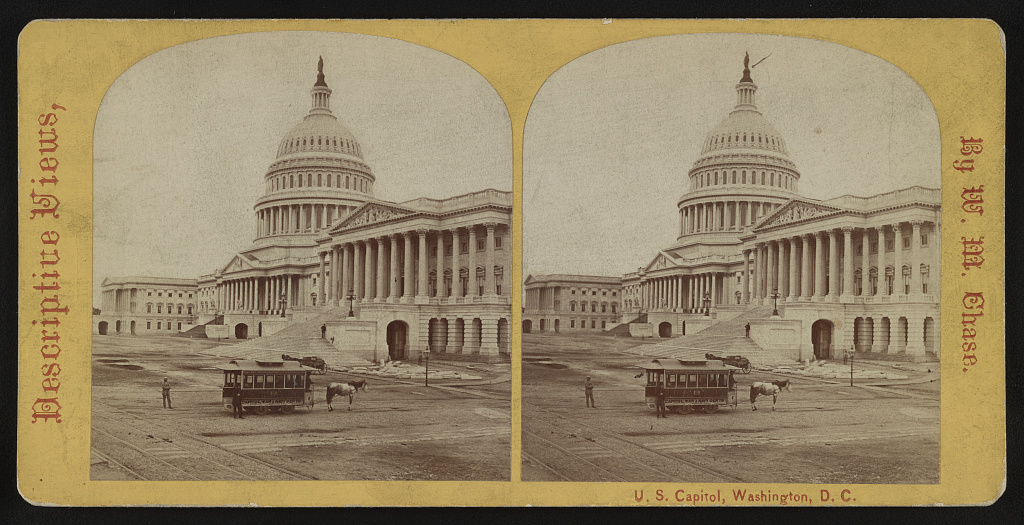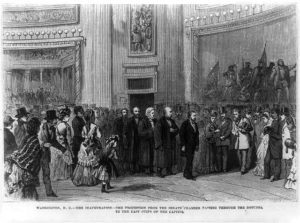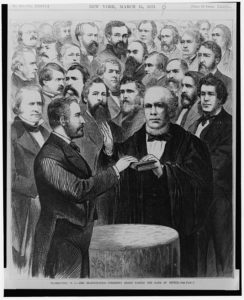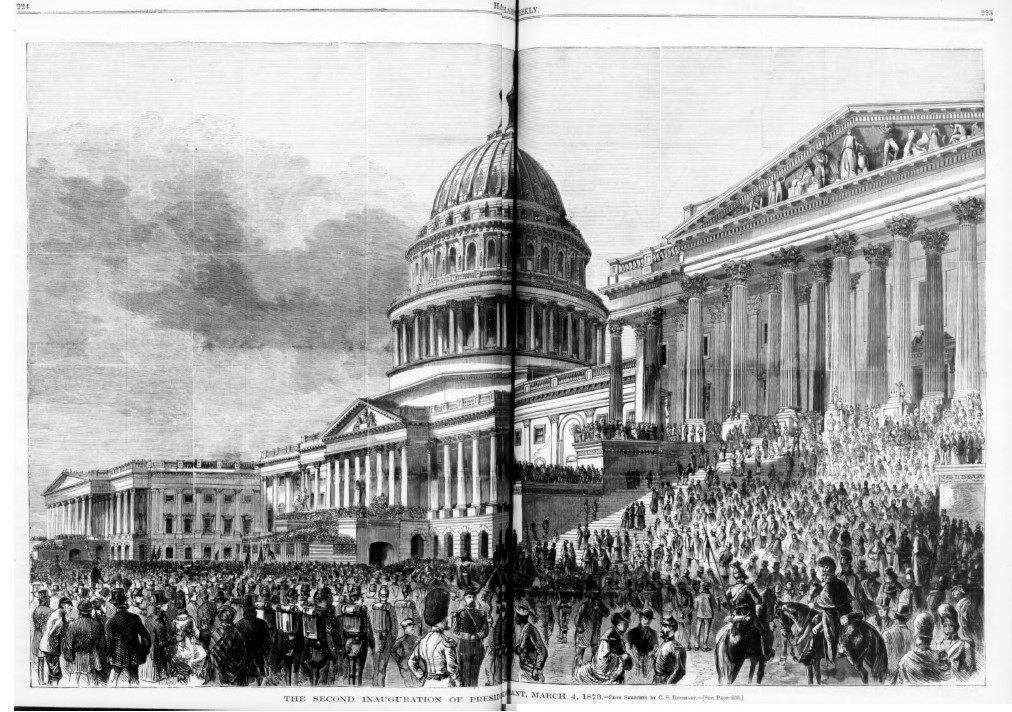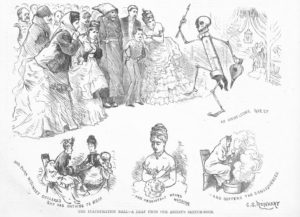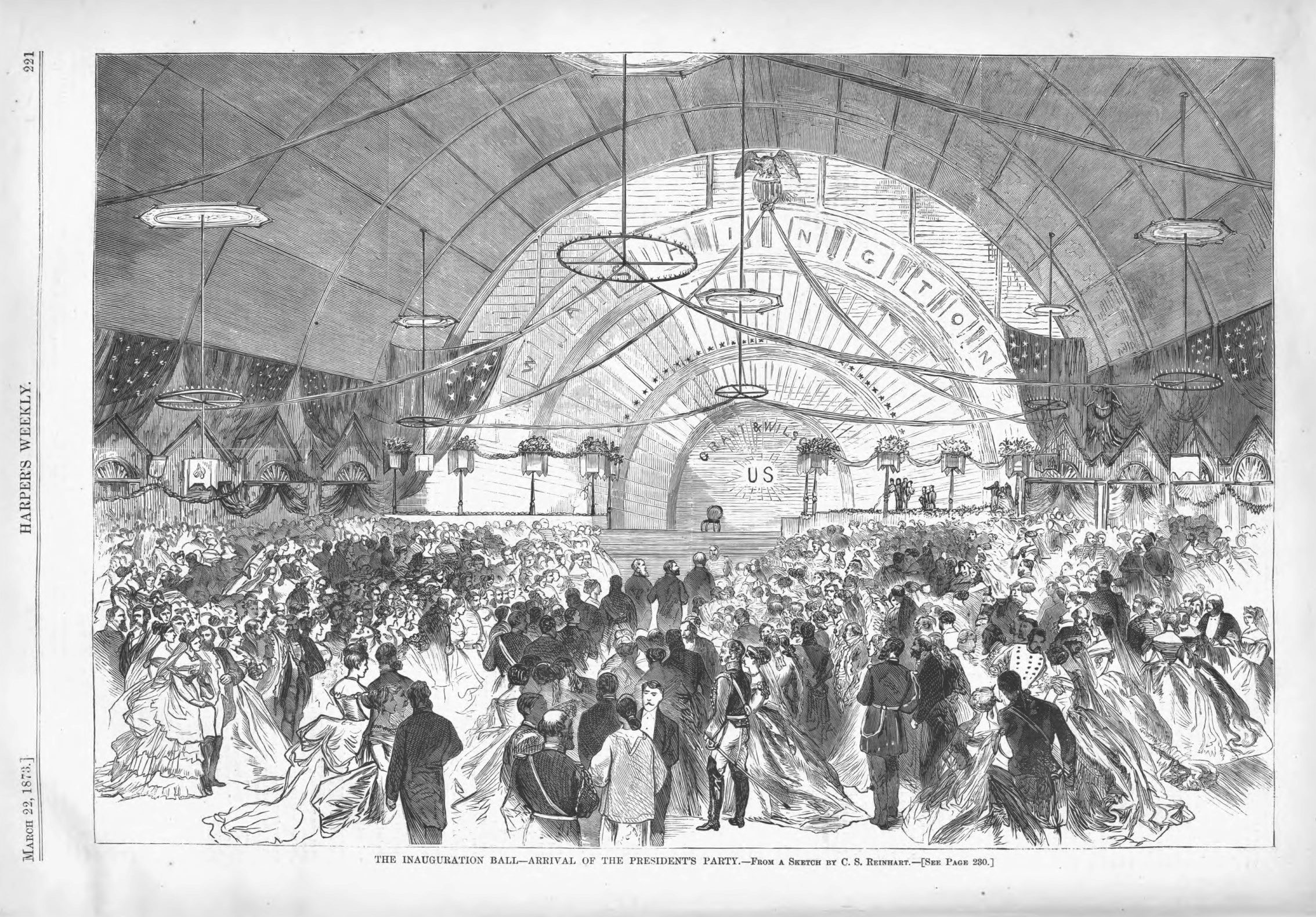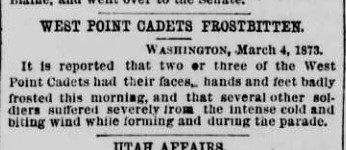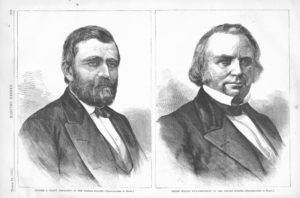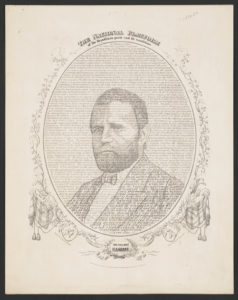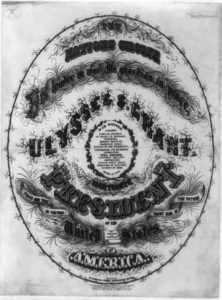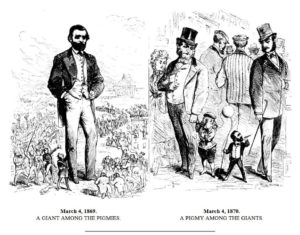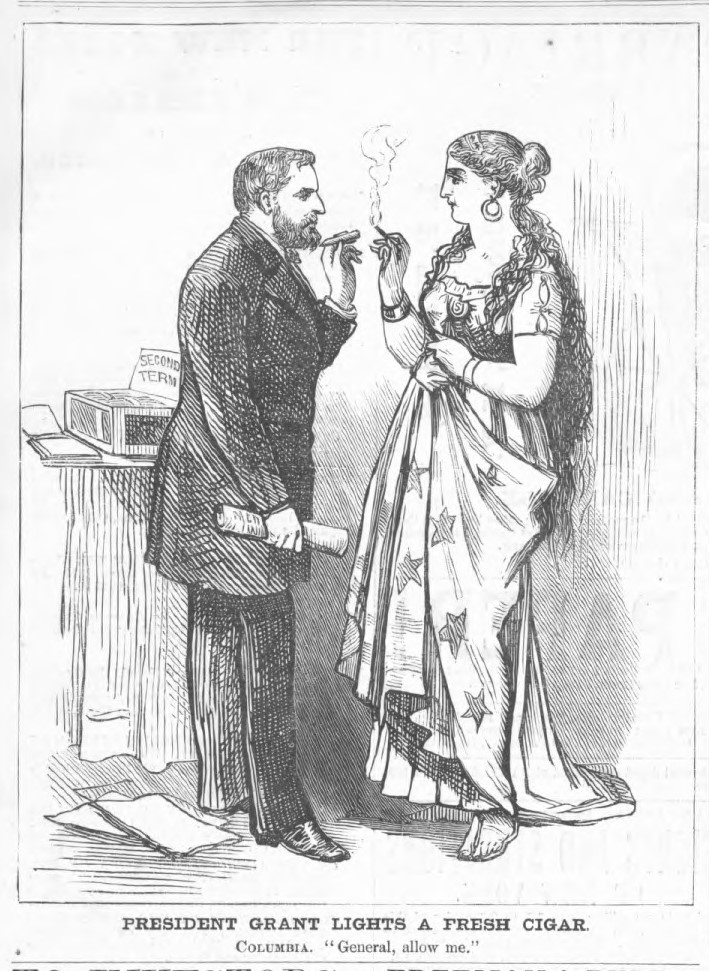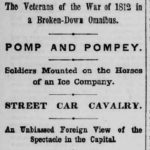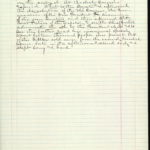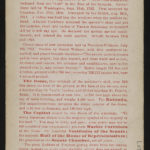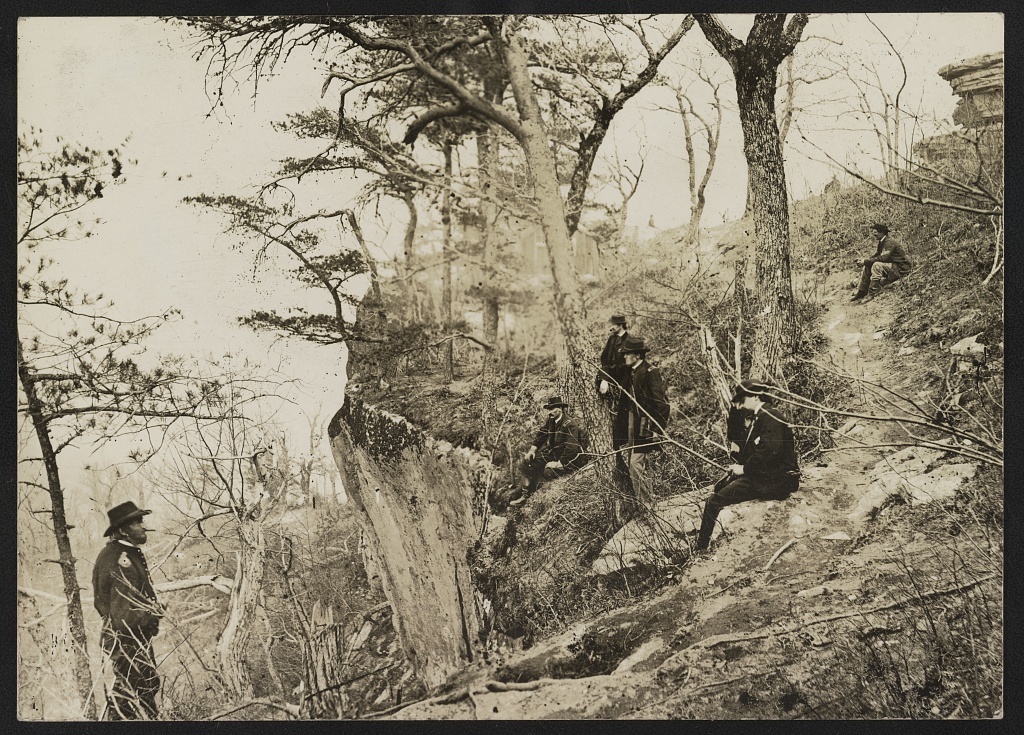President Ulysses S. Grant was inaugurated for his second term on March 4, 1873.
From the March 22, 1873 issue of Harper’s Weekly:
THE SECOND INAUGURATION.
THE second inauguration of ULYSSES S. GRANT as President of the United States was an event never to be forgotten by those who were privileged to witness the ceremony. The morning of the 4th of March opened with a cloudless sky that gave promise of a sunny day, but the wind was cold and keen, and its fitful gusts carried a chill to the hearts of those who dared to face them. The principal streets of the national capital had been carefully cleaned, and the buildings, public and private, garnished and decorated for the occasion. All of the previous day and night the inbound trains and steamers brought their countless hosts of eager ones who would see the inauguration. The hotels and boarding-houses were all full, and many were unable to procure lodgings of even the most inferior kind. These contented themselves with walking the streets until the appointed hour had come. Of militia-men there was seemingly no end to the number. Every train of cars brought a detachment of soldiers, and so great was the demand upon the roads that many were belated, and some failed to reach the city until after the ceremony was over.
The military procession to the Capitol was the most imposing ever witnessed on such an occasion. Pennsylvania Avenue on the line of march was elaborately decorated; every building was covered with flags, and from every window floated streamers and banners. Every window and balcony was occupied, and throngs of people filled the streets. At ten o’clock precisely the troops began to move, headed by Chief Marshal General BARRY. First in order, and naturally attracting most attention, was the corps of cadets from West Point. As regiment after regiment marched past the multitude cheered them vociferously to the end. Besides the military there were a number of civic societies in the line. The firemen of the District were also out in their best dress.
The inaugural ceremony took place on the east front of the Capitol, where a temporary platform had been erected for the purpose. The open space below, where the troops were massed in solid column, was literally packed with people, while the eastern fronts of both Senate and House wings were black with a solid mass of spectators. Even the cornice upon the roof and about the dome was filled. At length the ceremonies began with the appearance of the President, who, immediately after the organization of the new Senate, came upon the portico and advanced to the front of the platform. Here, with uncovered head, the President took the oath of office at the hands of the Chief Justice for the second term. The crowd below sent up a deafening huzza at this moment, and the howitzer battery of the Naval School at the south end of the square, and the Light Artillery at the north end, boomed out a salute of twenty-one guns. The President then, standing conspicuously in the front of the dense crowd on the platform, and despite the sweeping winds and biting atmosphere, calmly read his inaugural address. Our artist’s graphic delineation of the scene on pages 224 and 225 will enable the reader to judge of its grandeur.
The inaugural over, the troops escorted the President to the White House, where a review took place, after which the soldiers returned to their respective quarters. The scene on the return march was even grander and more impressive than on the march to the Capitol. The crowd on the Avenue was even larger, and the enthusiasm unbounded. In the evening a magnificent display of fire-works on the Capitol grounds closed the out-door exercises of the celebration.
Of course there was a grand ball at night, and this was the most complete and elegant affair of the kind within the memory of man. The building in which the dancers danced was specially constructed for the occasion, at a cost of $60,000. It was of wood, and was 350 feet long by 150 feet wide, with a clear floor space of 300 by 100 feet. The room was gayly decorated and brilliantly lighted.
At the south end of the hall there were small arches for the entrances of the invited guests, above them shields, and above all, draperies, which, with a star in gas jets in the centre, were intended to eclipse the “Grant and Wilson and Peace” first intended to occupy the vacant space. At the opposite end was the platform for the President, invited guests, and other favored ones. The platform was thirty-five feet wide by seventy feet long, and was handsomely draped. Across the front were high candelabra, to support plants in pots in lieu of gas-lights. On the sides were draperies of white; on the trusses and between, where the draperies did not interfere with the arched entrances, were flags draped in arches, headed by the shields of the different States. The trusses were painted to represent columns in chrome-colors.
The President and cabinet arrived about half past eleven o’clock, and after a short stay in their reception-rooms the grand entrance was made in formal procession, the chairman of the Committee of Arrangements, Hon. H.R. SHEPHERD, and HALLET KILBOURN, Esq., chairman of the Ball Committee, doing the escort duty. Governor COOK entered with the President, and after the cabinet came the diplomatic corps. They moved through the centre of the room to the platform at the north end to the music of Hail to the Chief by the Naval Academy band. As many as 3000 persons engaged in the dance, most of whom were of the most distinguished families in the land. The supper was gotten up on a magnificent scale, and was said to be the most liberally provided ever furnished to the good people of Washington. An illustration of the ball-room scenes is given by our artist on page 221.
Inauguration balls have not always been honored with a specially erected building. It was not until General Taylor was inaugurated that, it having become evident there was no hall in Washington that could give satisfaction as a ball room on public occasions, a temporary building was constructed on Judiciary Square. Afterward the balls following the inaugurations of PIERCE, BUCHANAN, and LINCOLN were held in a similar building erected in the same square. At the second inauguration of LINCOLN the ball was in the “model-room” of the Patent-office. The chief feature of this ball, as now remembered, was the confusion which prevailed in the hat and cloak rooms when the ball was over, and everybody, apparently, wanted what nobody could give. The first inauguration ball of President GRANT was held in the north wing of the Treasury Building, and the accommodations there were too limited. The arrangements made for the last ball entirely prevented the inconvenience and crowding conspicuous on previous occasions.
One of the places you can read the inaugural address is at Project Gutenberg:
ULYSSES S. GRANT, SECOND INAUGURAL ADDRESS
TUESDAY, MARCH 4, 1873
[Transcriber’s note: Frigid temperatures caused many of the events planned for the second inauguration to be abandoned. The thermometer did not rise much above zero all day, persuading many to avoid the ceremony on the East Portico of the Capitol. The oath of office was administered by Chief Justice Salmon Chase. A parade and a display of fireworks were featured later that day, as well as a ball in a temporary wooden structure on Judiciary Square. The wind blew continuously through the ballroom and many of the guests at the ball never removed their coats.]
Fellow-Citizens:
Under Providence I have been called a second time to act as Executive over this great nation. It has been my endeavor in the past to maintain all the laws, and, so far as lay in my power, to act for the best interests of the whole people. My best efforts will be given in the same direction in the future, aided, I trust, by my four years’ experience in the office.
When my first term of the office of Chief Executive began, the country had not recovered from the effects of a great internal revolution, and three of the former States of the Union had not been restored to their Federal relations.
It seemed to me wise that no new questions should be raised so long as that condition of affairs existed. Therefore the past four years, so far as I could control events, have been consumed in the effort to restore harmony, public credit, commerce, and all the arts of peace and progress. It is my firm conviction that the civilized world is tending toward republicanism, or government by the people through their chosen representatives, and that our own great Republic is destined to be the guiding star to all others.
Under our Republic we support an army less than that of any European power of any standing and a navy less than that of either of at least five of them. There could be no extension of territory on the continent which would call for an increase of this force, but rather might such extension enable us to diminish it.
The theory of government changes with general progress. Now that the telegraph is made available for communicating thought, together with rapid transit by steam, all parts of a continent are made contiguous for all purposes of government, and communication between the extreme limits of the country made easier than it was throughout the old thirteen States at the beginning of our national existence.
The effects of the late civil strife have been to free the slave and make him a citizen. Yet he is not possessed of the civil rights which citizenship should carry with it. This is wrong, and should be corrected. To this correction I stand committed, so far as Executive influence can avail.
Social equality is not a subject to be legislated upon, nor shall I ask that anything be done to advance the social status of the colored man, except to give him a fair chance to develop what there is good in him, give him access to the schools, and when he travels let him feel assured that his conduct will regulate the treatment and fare he will receive.
The States lately at war with the General Government are now happily rehabilitated, and no Executive control is exercised in any one of them that would not be exercised in any other State under like circumstances.
In the first year of the past Administration the proposition came up for the admission of Santo Domingo as a Territory of the Union. It was not a question of my seeking, but was a proposition from the people of Santo Domingo, and which I entertained. I believe now, as I did then, that it was for the best interest of this country, for the people of Santo Domingo, and all concerned that the proposition should be received favorably. It was, however, rejected constitutionally, and therefore the subject was never brought up again by me.
In future, while I hold my present office, the subject of acquisition of territory must have the support of the people before I will recommend any proposition looking to such acquisition. I say here, however, that I do not share in the apprehension held by many as to the danger of governments becoming weakened and destroyed by reason of their extension of territory. Commerce, education, and rapid transit of thought and matter by telegraph and steam have changed all this. Rather do I believe that our Great Maker is preparing the world, in His own good time, to become one nation, speaking one language, and when armies and navies will be no longer required.
My efforts in the future will be directed to the restoration of good feeling between the different sections of our common country; to the restoration of our currency to a fixed value as compared with the world’s standard of values—gold—and, if possible, to a par with it; to the construction of cheap routes of transit throughout the land, to the end that the products of all may find a market and leave a living remuneration to the producer; to the maintenance of friendly relations with all our neighbors and with distant nations; to the reestablishment of our commerce and share in the carrying trade upon the ocean; to the encouragement of such manufacturing industries as can be economically pursued in this country, to the end that the exports of home products and industries may pay for our imports—the only sure method of returning to and permanently maintaining a specie basis; to the elevation of labor; and, by a humane course, to bring the aborigines of the country under the benign influences of education and civilization. It is either this or war of extermination: Wars of extermination, engaged in by people pursuing commerce and all industrial pursuits, are expensive even against the weakest people, and are demoralizing and wicked. Our superiority of strength and advantages of civilization should make us lenient toward the Indian. The wrong inflicted upon him should be taken into account and the balance placed to his credit. The moral view of the question should be considered and the question asked, Can not the Indian be made a useful and productive member of society by proper teaching and treatment? If the effort is made in good faith, we will stand better before the civilized nations of the earth and in our own consciences for having made it.
All these things are not to be accomplished by one individual, but they will receive my support and such recommendations to Congress as will in my judgment best serve to carry them into effect. I beg your support and encouragement.
It has been, and is, my earnest desire to correct abuses that have grown up in the civil service of the country. To secure this reformation rules regulating methods of appointment and promotions were established and have been tried. My efforts for such reformation shall be continued to the best of my judgment. The spirit of the rules adopted will be maintained.
I acknowledge before this assemblage, representing, as it does, every section of our country, the obligation I am under to my countrymen for the great honor they have conferred on me by returning me to the highest office within their gift, and the further obligation resting on me to render to them the best services within my power. This I promise, looking forward with the greatest anxiety to the day when I shall be released from responsibilities that at times are almost overwhelming, and from which I have scarcely had a respite since the eventful firing upon Fort Sumter, in April, 1861, to the present day. My services were then tendered and accepted under the first call for troops growing out of that event.
I did not ask for place or position, and was entirely without influence or the acquaintance of persons of influence, but was resolved to perform my part in a struggle threatening the very existence of the nation. I performed a conscientious duty, without asking promotion or command, and without a revengeful feeling toward any section or individual.
Notwithstanding this, throughout the war, and from my candidacy for my present office in 1868 to the close of the last Presidential campaign, I have been the subject of abuse and slander scarcely ever equaled in political history, which to-day I feel that I can afford to disregard in view of your verdict, which I gratefully accept as my vindication.

